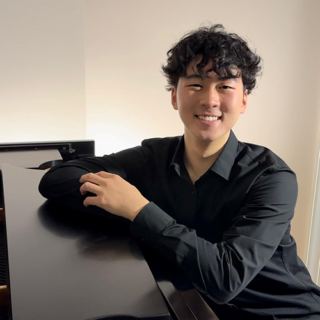2023 Advanced Piano Student Recital
Daniel Young-Hwan Kim, Student of Wen-Yin Chan
By Mark Irchai, Levine Piano Faculty
The program offered a compelling, chronologically motivated journey through various styles and periods of piano music, showcasing pianist Daniel Young-Hwan Kim’s versatility and expressive range. The performance began with Bach’s Prelude and Fugue in B Minor from The Well-Tempered Clavier, Book 2. Kim’s playing was marked by clarity and a seamless dialogue between the hands, clearly showcasing an intelligent, thoughtful, and musical ear. Though some issues with rushing in chromatic sections of the fugue occurred, his recoveries were impressive, and displayed a keen understanding of the musical score.
He then took a brief moment to speak about the next piece, Mozart’s Piano Sonata in C minor, K. 457, offering some eloquent, well-thought-out comments on the intellectual side of the compositional process. I would love to hear him talk more about this in future, especially as he continues his musical studies at the University of Michigan! Kim’s sparkling sound and brisk tempo lent a sense of urgency to the first movement, while his interpretation in the second movement demonstrated fine pedal control and a pure, present voicing. The third movement was a highlight, characterized by thoughtfully paced phrasing and a beautifully “stormy” atmosphere that captured the sonata’s dramatic essence.
The selections from Chopin’s Preludes Op. 28 revealed Kim’s nuanced touch and interpretive depth. The 17th Prelude had a natural bel canto quality that was delightful, hardly marred by some occasional left-hand inconsistencies. In contrast, the 18th was a virtuosic tour de force, driving the audience into the intensity of Chopin’s soundscape with vivid energy. Each subsequent piece brought a different mood, from the dark sweep of the 21st to the glittering brilliance of the 23rd, with Kim handling the textural shifts and register changes effortlessly.
The program continued after a brief intermission with Scriabin’s Polonaise in B-flat Minor, Op. 21, where Kim’s affinities for the dance-like rhythm and Chopin-inspired passages were unmistakable. In particular, the octaves were executed brilliantly, showing a confident grasp of the piece’s technical demands.
Debussy’s La Plus Que Lente allowed Kim to explore a different palette and a new depth to his artistry. Here, he embraced a hazy, impressionistic tone. His sense of jazz-inspired rhythms, stemming from his intimate knowledge of jazz improvisation, added a unique, extremely compelling dimension to his playing. Occasionally, some of the larger moments leaned towards a brightness that slightly exceeded the textural expectations normally associated with Debussy’s writing.
Concluding the concert was Kim’s own composition, Piano Trio No. 1, Op. 1 in C Minor, written in November 2020. This piece displayed beautiful influences from Tchaikovsky, particularly in its rich understanding of instrumental color. Its rhythmic drive and dark, dramatic character stood out, with a particularly lyrical B-flat major section offering a poignant contrast. I would love to hear more of his compositional work, and would even be eager to explore opportunities to perform some of them myself!
Overall, the performance was a testament to Daniel Young-Hwan Kim’s artistic versatility, deftly navigating different styles while imprinting his unique voice on each piece. Daniel is clearly a thoughtful, deep, and nuanced musician, and I was deeply impressed by his ability to tackle such a breadth of repertoire, and even include his own composition that absolutely deserved a place on the program next to the masterworks presented earlier in the concert. I look forward to future performances of this young, budding artist!

